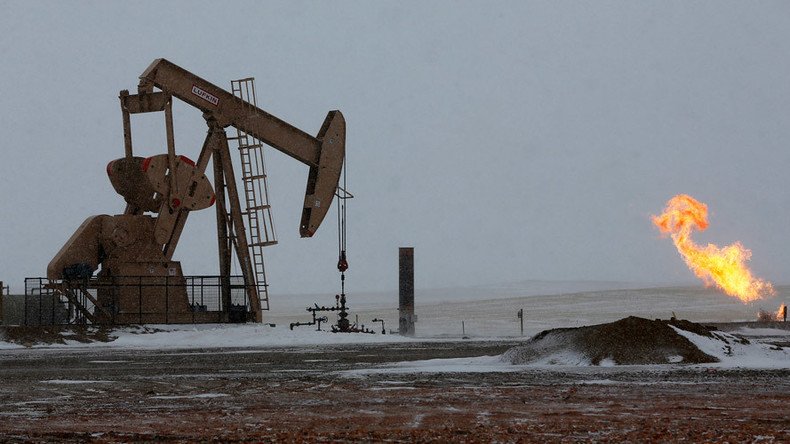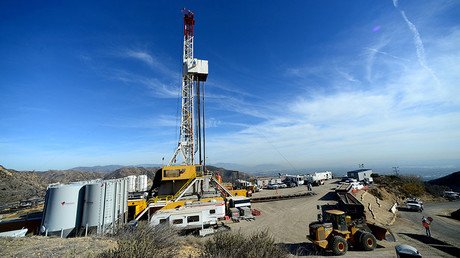Despite environmental concerns, North Dakota approves largest capacity crude oil pipeline

North Dakota regulators have approved a proposal to build the largest capacity pipeline to date. The 1,130-mile long pipeline seeks to transport nearly 600,000 barrels of crude oil from the Bakken oil fields through 50 counties across four states.
On Tuesday, the North Dakota Public Service Commission approved permits for a pipeline that would transport crude oil through the Dakotas, Illinois, and Iowa. The all-Republican panel voted 2-0 in favor of the pipeline, with one member abstaining due to a conflict of interest.
Iowa is the only state yet to approve permits, however, The News and Observer reports that Energy Transfer Parts, the company behind the project, expects Iowa to approve by next month.
According to The News & Observer, the project is estimated to cost roughly $3.8 billion, with the North Dakota leg alone costing $1.4 billion. The Southern Illinoisan reported that Energy Transfer Partners, a Dallas-based company, claims to have easement agreements on 85 percent of the land the pipeline crosses.
Arbitrary, unjustified’: Keystone XL pipeline builder sues US government over rejection https://t.co/53lRkd8E9ypic.twitter.com/Q0sEWzDO7m
— RT America (@RT_America) January 7, 2016While the North Dakota Public Service Commission may have unanimously approved the pipeline, not everyone else is. The Bismarck Tribune reported that Dakota Access LLC, a subsidiary of Energy Transfer Partners, had filed, “23 condemnation suits against 140 individuals, banks, and a coal mine to gain easements through North Dakota.”
Derrick Braaten, a Bismarck attorney representing about a third of landowners who wanted better terms for their agreement, told The Bismarck Tribune that his clients were seeking better deals and thorough protection of their land. According to a North Dakota State University publication, the goal of land reclamation is restoring “a site disturbed during the construction activities associated with oil and gas production to its pre-disturbance ecological structure and functions.”
Land reclamation is an important issue to many landowners affected by the Dakotas Access pipeline. The Grand Forks Herald reported that, earlier this month, over 7,000 gallons of saltwater (a waste product of oil and gas production) leaked from a different pipeline in North Dakota. Owned by a subsidiary of Summit Midstream, the leak was found in the same system responsible for the Blacktail Creek leak, which resulted in about 3 million gallons of saltwater leaking out of the pipeline.
The Blacktail Creek leak occurred in 2015, and the resulting contamination reached the Little Muddy and the Missouri rivers. The resulting effects are still being determined by the Environmental Protection Agency. However, chloride levels around the pipeline rupture were estimated to be as high as 900 times above normal. Ammonia levels were found to be up to 400 times higher than normal.
It is environmental incidents like these that lead to what The Bismarck Tribune calls “pipeline fatigue” and a resistance to pipelines by landowners. Another issue some landowners have with these large-scale projects is the bureaucracy that they face and lack of accountability.
Nathan Brenna, a North Dakota farmer and rancher, told The Bismarck Tribute that “before it’s done, 10 to 20 contractors are involved.” Subcontractors are the people that landowners are told to talk to when they face land reclamation issues, such as weeds or damaged property. Vawnita Best told The Tribune that “We don’t have time to manage their subcontractors.”
Despite these problems, Energy Transfer Partners hope to complete the Dakotas Access pipeline by the end of 2016, the Des Moines Register reports. If easements are not reached voluntarily, the company is prepared to use eminent domain to take land, the Southern Illinoisan reports.
Some landowners have attempted to fight the use of eminent domain. Last May, three landowners filed a lawsuit attempting to prevent Dakota Access LLC from claiming eminent domain. However, a judge dismissed the lawsuit in October according to KCCI.













